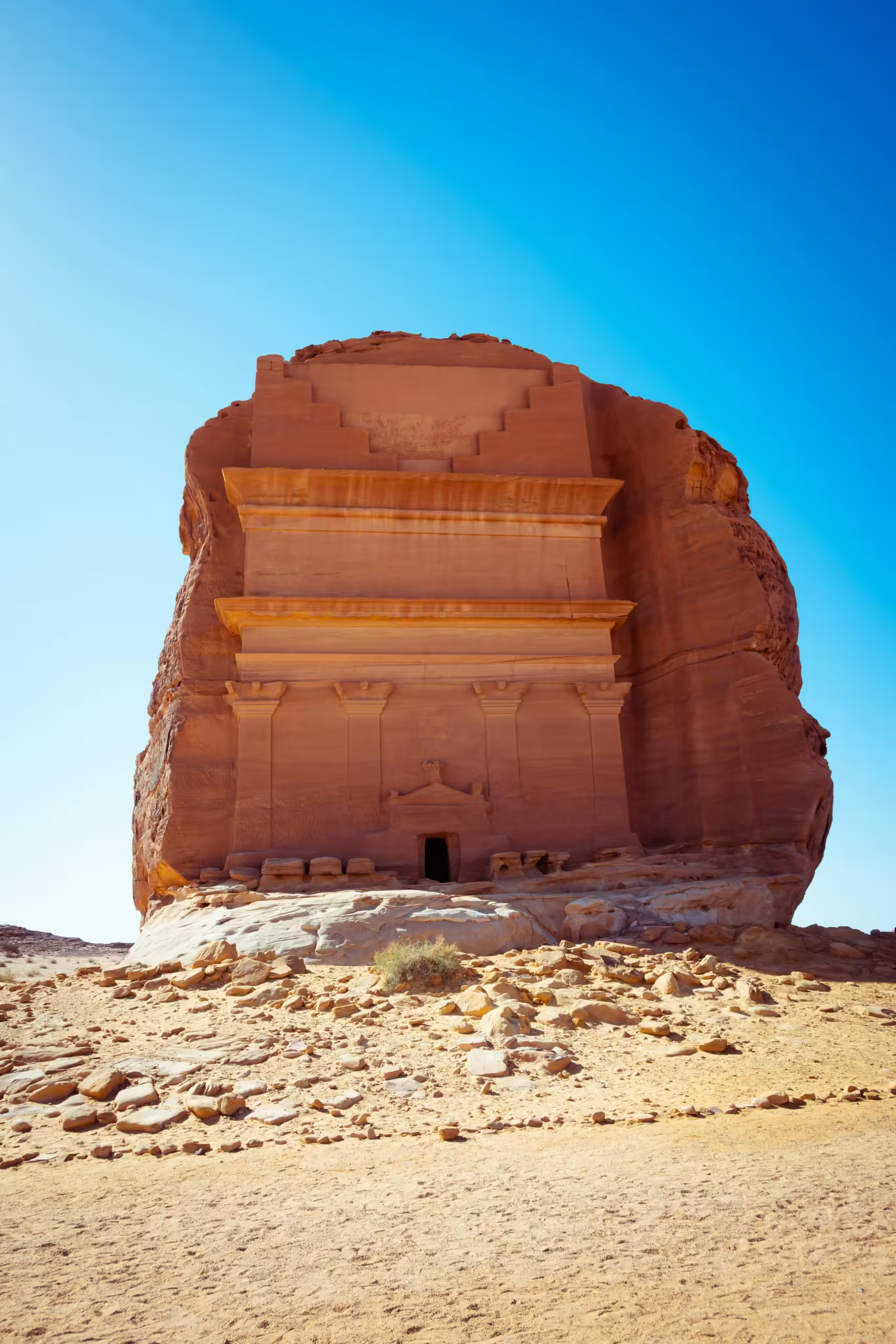Al Ula in Saudi Arabia
Discover AlUla in Saudi Arabia
Nestled in the heart of north-western Saudi Arabia, AlUla is a destination that captivates with its blend of ancient heritage, dramatic landscapes, and contemporary creativity. Once a vital stop along the Incense Route, this oasis town has evolved into a cultural and adventure hub, offering travellers a rich tapestry of experiences. Whether you're drawn by its archaeological wonders, intrigued by its art scene, or seeking serenity in the desert, AlUla invites you to explore a world where history and innovation coexist.
A Landscape Carved by Time
AlUla’s terrain is unlike any other. Towering sandstone cliffs, sculpted by millennia of wind and water, frame the horizon. These formations create a surreal backdrop for exploration, especially at sites like Elephant Rock. This natural monument, standing 52 metres tall, resembles its namesake and glows warmly under the setting sun. Visitors often gather here to enjoy coffee and conversation as the desert transforms with the fading light.
The region’s geological beauty is matched by its historical depth. Hegra, Saudi Arabia’s first UNESCO World Heritage Site, showcases over 110 tombs carved into rock faces by the Nabataeans more than 2,000 years ago. These tombs, with their intricate facades and inscriptions, reflect the architectural prowess and cultural richness of a civilisation that once thrived in the Arabian Peninsula.
Cultural Heritage and Historic Sites
AlUla’s story stretches back over 200,000 years. It was once home to the Dadan and Lihyan kingdoms, whose legacy lives on in sites like Dadan and Jabal Ikmah. Dadan served as a capital city, while Jabal Ikmah is often referred to as an open-air library, with hundreds of inscriptions etched into rock surfaces. These writings offer insights into ancient beliefs, trade practices, and daily life.
The Old Town of AlUla, dating back to the 12th century, adds another layer to the region’s historical narrative. Its labyrinthine alleys and mudbrick houses whisper tales of generations past. Many of these homes remained inhabited until the 1980s, and today, the area has been preserved as a living museum. Guided tours reveal the town’s role in trade and pilgrimage, connecting visitors with its enduring spirit.
Art and Innovation in the Desert
While AlUla honours its past, it also embraces the future. The AlJadidah Arts District is a vibrant space where creativity flourishes. Here, visitors can explore galleries, attend workshops, and enjoy live performances. The district is home to the AlUla Public Library, Design Space AlUla, and the AlUla Music Hub, each offering unique cultural experiences.
One of the most striking modern landmarks is Maraya Concert Hall. This mirrored building, which holds the Guinness World Record for the largest mirrored structure, reflects the surrounding desert in a stunning visual display. Maraya hosts concerts, exhibitions, and events, blending architecture with nature in a way that feels both futuristic and grounded.
Looking ahead, Wadi AlFann, meaning “Valley of the Arts”, is set to become a 40-mile stretch of land dedicated to permanent art installations. Five internationally renowned artists will create works inspired by AlUla’s landscape, further cementing the region’s reputation as a global arts destination.
Wellness and Adventure
AlUla offers more than sightseeing; it’s a place to reconnect with oneself. Wellness programmes, including yoga retreats and spa treatments, are available across its resorts. The AlUla Wellness Festival, held annually, brings together practitioners and enthusiasts for a celebration of health and mindfulness.
For those seeking adventure, the desert provides ample opportunity. Zip-lining, hiking, and hot air balloon rides offer thrilling perspectives of the terrain. The AlUla Stairway, suspended nearly 45 metres in the air, challenges visitors with its daring design. Helicopter tours and safari-style excursions allow for immersive exploration of the region’s natural beauty.
Culinary Delights and Local Flavours
Food in AlUla is a celebration of tradition and innovation. Restaurants like Somewhere serve Mediterranean fusion dishes, while Tama offers Middle Eastern fare in a serene desert setting. Joontos, led by Chef Jaume Puigdengolas, presents Saudi-inspired cuisine with a modern twist.
Coffee culture is deeply rooted in Saudi life, and AlUla is no exception. Saudi coffee, or qahwa, is a must-try, often served with dates and infused with cardamom. Local cafés and hotel lounges provide the perfect setting to enjoy this aromatic beverage.
The region is also known for its citrus groves, with over 200,000 trees producing lemons, oranges, and grapefruits. One unique fruit, torounge, a hybrid of lemon and pomelo, has historical significance, having been used by the Nabataeans in perfumes and preserves.
Where to Stay
Accommodation in AlUla ranges from luxury resorts to boutique hotels, each offering a distinct experience. Banyan Tree AlUla, located in Ashar Valley, features private villas inspired by Nabataean architecture. Guests can unwind in plunge pools or dine at Saffron, the resort’s Thai restaurant.
Our Habitas AlUla provides a more immersive desert experience, with villas designed for stargazing, art appreciation, and wellness. The property’s restaurant, Tama, complements the tranquil surroundings with locally inspired dishes.
Dar Tantora The House Hotel, situated in the Old Town, offers a heritage-rich stay. Its mudbrick architecture and antique decor create a sense of timelessness, while modern amenities ensure comfort. The hotel’s eateries, including Maqha Cafe and The Cigar Oasis, cater to diverse tastes.
When to Visit
AlUla is a year-round destination, but the most pleasant months are October through April. During this period, temperatures range from 15°C to 25°C, ideal for outdoor activities and cultural events. The winter season coincides with several festivals, including Azimuth, AlUla Skies, and Winter at Tantora, each adding vibrancy to the visitor experience.
Every two years, Desert X AlUla transforms the landscape with contemporary art installations. The next edition, scheduled for 2026, will take place in Wadi AlFann and promises to be a highlight for art lovers.
Getting There and Around
AlUla International Airport (ULH) connects the region to major cities such as Riyadh, Jeddah, and Dammam, as well as international hubs like Dubai, Doha, Paris, Amman, and Bahrain. Car rentals are available at the airport, with options for self-drive or chauffeur services. Ride-hailing apps like Careem and Taxa offer convenient local transport.
A Sustainable Vision
AlUla’s development is guided by sustainability. Over half of its land is designated as nature reserves, and initiatives like the planting of native trees aim to combat desertification. Eco-resorts are built with minimal environmental impact, and green building certifications are mandatory for new projects.
The AlUla Light Rail, currently under development, will connect key heritage sites via a carbon-neutral tram system. This project, part of the broader 360 Mobility Plan, enhances accessibility while reducing reliance on private vehicles.
Final Thoughts
AlUla in Saudi Arabia is more than a destination—it’s an experience that resonates with history, culture, and nature. Whether you’re wandering through ancient tombs, admiring mirrored architecture, or sipping coffee beneath the stars, AlUla offers moments of wonder and reflection. With its commitment to sustainability and inclusive hospitality, it welcomes all who seek meaningful travel.

